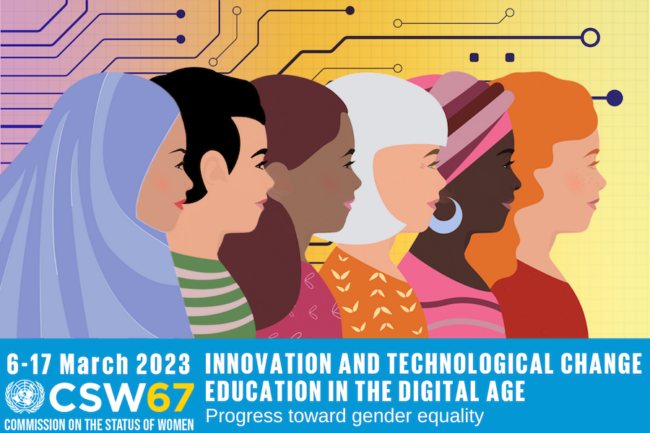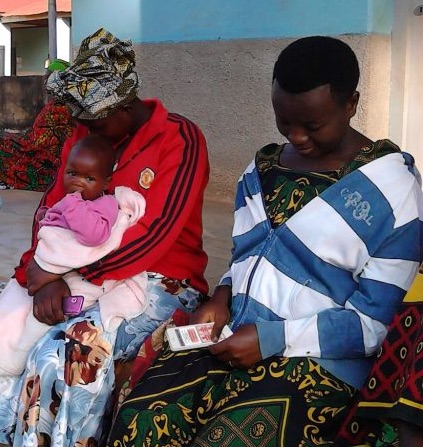Harnessing digital technologies to empower mothers – and their children
02.03.23
UN New York, CSW67 - Digital technologies, which is the priority theme of the upcoming Commission on the Status of Women, have the potential to greatly increase women’s agency and autonomy, as well as their power to make decisions and to challenge harmful norms and practices. Promising areas of applications identified in our written statement to the Commission include education, maternal and child health, parenting support and fathers engagement, as well as entrepreneurship and access to paid work. Still there are a number of obstacles and challenges that must be addressed and for which we provide recommendations.

The following is the full text of MMM’s written statement to the 67th UN Commission on the Status of Women.
The Covid-19 crisis has created a historic momentum for innovation and the development of digital solutions that have the potential to simplify and improve the daily lives of millions of women, in particular mothers.
By making it possible to access increasingly varied and personalized information, tools and services, digital technologies can greatly increase women’s agency and autonomy, as well as their power to make decisions and to challenge harmful norms and practices.
The question now is, can we capitalize on this momentum: how can we make women, and particularly mothers, benefit from it in order to reduce poverty and economic disparities, and improve their living conditions? How can digital technologies empower mothers and enable them to fulfill their different roles inside and outside the home?
For mothers, several areas of application are especially promising, albeit not without challenges.
1. Education and access to information to improve mothers’ agency
Digital technologies can allow women to continue their own education or professional training especially if they had to leave school because of early marriage and motherhood, or because of limited resources to pay school fees. Online education and training have the advantage of being less costly than in situ training and its time flexibility is more compatible with childcare responsibilities. It is a path for life-long learning, and can in particular support mothers’ re/entry into the Labour market.
2. Access to information supporting parenting
The potential of digital technologies is also important in relation to parenting education and access to information supporting their role as mothers. In particular:
– To become aware of their rights (and those of their daughters), in particular regarding their sexuality and harmful traditional practices
– To promote sexual education, in particular their knowledge on contraceptive techniques, in order to reduce unwanted pregnancies and violence – digital technologies can be all the more effective in this area as they can be anonymous and totally customizable.
– To receive education or information related to motherhood and maternal and child health, on topics such as pregnancy, breastfeeding, early childhood development, parenting, care and education, nutrition, mental health, basic medical care for their children and themselves, etc. – This type of education/information can result in important positive maternal and child health outcomes. Educating mothers on the importance of supporting early childhood development through nurturing care can transform a child’s future
For example, the association Education as a Vaccine in Nigeria is using digital technology for Complete Sexual Education. They note a lot of benefits of using such a learning method, including: increase in reach of intervention, removal of barriers caused by social norms, anonymity and easy access, confidential and non-judgmental services, tailored information and services.
An example of app supporting Early Childhood Development is Baby-buddy, which has been successfully deployed in the UK. This app provides timely information and advice to parents during pregnancy and the first 6 months of their child’s life, thereby helping mothers/parents ‘look after their baby’s mental and physical health, as well as their own, and give their baby the best start in life’.
An example of service empowering women to become actors of their own health is Zero Mothers Die. Free mobile phones are provided to expecting mothers living in isolated areas in Africa – specifically Ghana, Gabon, Mali, Nigeria, and Zambia – and SMS are sent to equip mothers with essential information for having a healthy pregnancy and birth. The objective is to prevent potentially dangerous complications, and as its name implies, reduce maternal mortality and morbidity.
3. Access to maternal and child healthcare services
 In addition, health promotion and education Mobile health (mHealth) applications are also proving particularly useful for remote access to health care services. These apps typically seek to curb the lack of health care centres, which is prevalent in many developing countries, especially in rural and isolated areas, and which is a cause of high rates of maternal mortality and morbidity.
In addition, health promotion and education Mobile health (mHealth) applications are also proving particularly useful for remote access to health care services. These apps typically seek to curb the lack of health care centres, which is prevalent in many developing countries, especially in rural and isolated areas, and which is a cause of high rates of maternal mortality and morbidity.
An example of such an app is JamboMama!, which is being tested in Tanzania and RDC; it aims at connecting women (and their communities) with qualified maternal healthcare workers, and the health care system in which they work. The objective is again to improve maternal health, prevent complications during pregnancy and birth, and save the lives of mothers and babies.
4. Access to paid work and income generating activities
Digital technologies support the development of telework, which can facilitate work-life balance, especially for mothers and other caregivers who have to reconcile paid work with domestic and care responsibilities. The Covid-19 pandemic has made telework widespread in both the private and public sectors, at least for white-collar jobs in developed countries. Its benefits are clear: greater flexibility in working hours and better organisation of working time, as well as savings in commuting time and costs.
It is important to keep in mind that the challenges of offline work remain: women are more likely to work part-time and in “women’s work” sectors and jobs. It is also really important that telework does not become too feminized and a cause of isolation and an obstacle to work promotion.
As its benefits can apply to both parents, telework could instead support a more equitable sharing of unpaid care responsibilities and work between men and women – if only employers monitor and address gender gaps in its use and ensure that it does not become a woman’s choice only.
A specific type of telework is platform work, which has recently emerged and allows companies to contract workers across borders. Generally speaking, platform work has increased income-generating opportunities for women, especially in developing countries. Still, many challenges remain so that platform work qualifies as decent work and does not become precarious and exploitative.

5. Opportunities for mothers to create and develop their own business
Digital technologies also support and expand opportunities for women’s entrepreneurship, in particular when they are mothers: the ‘mompreneurs’ phenomenon clearly shows the advantages that they find in working from home and being their own boss: these individual businesses respond to a desire and need for greater organizational freedom in their work, while actively participating in economic activity, generating a personal income, and improving self-confidence in the process.
Still the status of mompreneur, like any independent work, can be very precarious. For example, many mothers have become independent community managers – which has become a women’s work, but often without adequate social protection.
6. Engaging fathers
Digital technologies can also be used effectively to engage fathers and thus support the redistribution of unpaid domestic and care work through shared parenting.
For example, SMS4dads is a simple service, which sends new fathers information, tips and connections to online services linked to their child’s developmental stage. These SMS are sent during pregnancy and the first months of the child’s life, and are intended to support fathers in caring for their own physical and mental health, nurturing strong relationships with their child, and developing strong parenting partnerships. SMS4Dads was successfully implemented in Australia, as well as in pilot programs in Kenya and Colombia.
5. Connecting with others and benefiting from support network
 Lastly, as many mothers suffer from isolation, digital technologies can allow them to connect to each other, exchange on their daily difficulties and joys, and build new forms of support networks.
Lastly, as many mothers suffer from isolation, digital technologies can allow them to connect to each other, exchange on their daily difficulties and joys, and build new forms of support networks.
For example, the app WeMoms which is used in many countries like France, Brazil, Spain and English-speaking countries, allows moms to join a community and ask questions about maternity, before and after birth, to other mothers. The community now connects more than 2 million mothers.
MMM recommendation to governments
Many important challenges clearly remain that must be recognized and addressed so that these potential benefits can be harnessed.
Governments must in particular:
- Address the multiple and intersecting digital divides, notably along the Gender, socio-economic status, and rural/urban location dimensions. This means focusing on rural and isolated areas, and, in still too many cases, it begins with electricity as 770 million people still live without access. This also means reducing or subsidizing the costs of individual equipment and services (mobile phones, computers, internet subscriptions…), financing proper school equipment, and supporting the opening of public places such as internet cafes with free access to the network, which are specifically aimed at women
- Support innovation and the development of tools, applications and software, which target and support mothers in their multiple roles and responsibilities and answer their specific needs, taking into account language (dialects, regional languages), local context, and the views of mothers themselves. Identify most promising areas of support and best practices that can be transposed and scaled-up
- Promote digital literacy, especially for women and girls, including on security and the risks associated with unreliable information and the dissemination of personal data, and on the risks of harassment and inappropriate encounters. Digital education must be systematically integrated in school curricula, and be proposed to young girls as well as to young boys without discrimination. Girls must also be encouraged to consider a career in STEM. For adults’ digital education, support to grass-roots associations working in this field is essential.
- Strengthen the laws to ensure that service and content providers offer secure digital environments, especially for women and children. Legal frameworks must also be put in place to ensure that decent work standards also apply to telework, in particular platform work
- Address gender norms, which remain a barrier for many women to use digital technologies, and change mentalities through institutional communication programs on the fact that access to digital technologies is a right for girls as well as boys, women as well as men, mothers as well as fathers.
Digital technologies offer huge potential to empower women, mothers in particular, through access to education and training, information supporting parenting and nurturing care, job and entrepreneurship opportunities, and tools to engage fathers. It can greatly contribute to advance Gender equality, contribute to sustainable social and economic development, and be truly transformative – if only governments recognize this potential, invest in digital infrastructure, and prioritize policies that aim at educating, informing and supporting mothers in their multiple roles.
Digital technologies are still very much linked to multiple divides, which exacerbate inequalities. We at MMM call on governments to ensure that digital technologies become an opportunity for all, and a driver for gender equality and women’s empowerment.
MMM full statement for download (with references)
MMM statement as a UN document – Ref. E/CN.6/2023/NGO/36
MMM submitted this written statement ahead of the 67th UN Commission on the Status of Women, which will take place on 6-17 March 2023 at the UN headquarters in New York. Its priority theme: Innovation and technological change, and education in the digital age for achieving gender equality and the empowerment of all women and girls.
MMM also co-sponsored the written statement of Associated Country Women of the World (ACWW)
The New EU Gender Equality Roadmap : A Call for Inclusion of Mothers
04.03.25
The European Commission’s initiative on a new Gender Equality Roadmap post-2025, marks a significant step forward in addressing gender disparities across the European Union. Make Mothers Matter (MMM
Breaking the Cycle: Gender Equality as a Path to Better Mental Health
18.03.25
The Council of the European Union has taken a decisive step in recognising the vital connection between gender equality and mental health.
Europe Must Listen to Mothers: Our landmark report heads to the European Parliament
28.08.25
On 22 September 2025, the voices of mothers will take centre stage in Brussels. For the first time, Make Mothers Matter (MMM) will present its State of Motherhood in Europe








